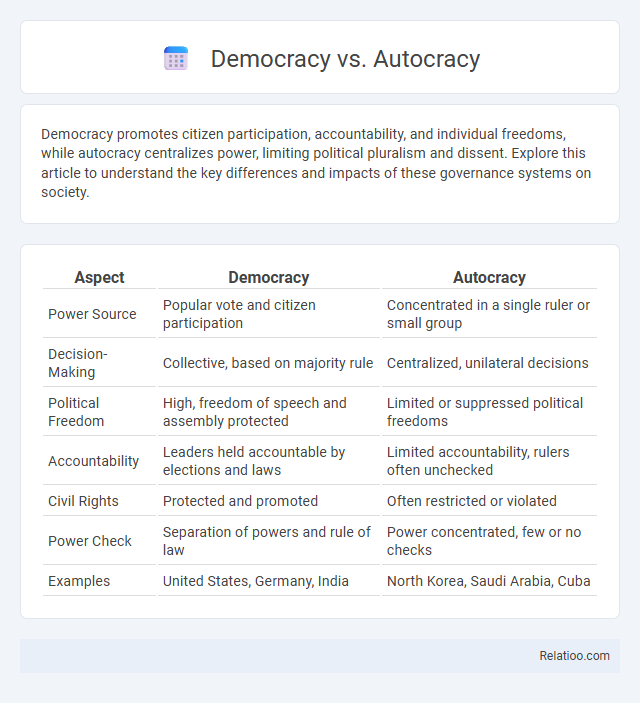Democracy promotes citizen participation, accountability, and individual freedoms, while autocracy centralizes power, limiting political pluralism and dissent. Explore this article to understand the key differences and impacts of these governance systems on society.
Table of Comparison
| Aspect | Democracy | Autocracy |
|---|---|---|
| Power Source | Popular vote and citizen participation | Concentrated in a single ruler or small group |
| Decision-Making | Collective, based on majority rule | Centralized, unilateral decisions |
| Political Freedom | High, freedom of speech and assembly protected | Limited or suppressed political freedoms |
| Accountability | Leaders held accountable by elections and laws | Limited accountability, rulers often unchecked |
| Civil Rights | Protected and promoted | Often restricted or violated |
| Power Check | Separation of powers and rule of law | Power concentrated, few or no checks |
| Examples | United States, Germany, India | North Korea, Saudi Arabia, Cuba |
Introduction to Governance Systems
Governance systems define the framework within which power is exercised and decisions are made, influencing the political, social, and economic environment of a society. Democracy empowers citizens through voting and representation, ensuring accountability and freedom, while autocracy centralizes control in a single ruler or party, often limiting political pluralism. Understanding these contrasting governance models helps you evaluate how power distribution impacts governance effectiveness and citizen participation.
Defining Democracy
Democracy is a system of governance where power is vested in the people, typically exercised through elected representatives and free, fair elections. It emphasizes political equality, individual rights, and the rule of law, ensuring that citizens have a direct or indirect say in decision-making. Your participation in a democratic process upholds accountability and transparency, contrasting sharply with autocratic systems where centralized authority limits public influence.
Understanding Autocracy
Autocracy centralizes power in the hands of a single ruler or a small group, limiting political pluralism and citizen participation. Understanding autocracy involves recognizing its impact on civil liberties, decision-making processes, and the potential for authoritarian control. Your awareness of these characteristics can help distinguish autocratic governance from democratic systems that promote accountability and inclusive representation.
Historical Evolution of Both Systems
Democracy evolved from ancient Greek city-states, emphasizing citizen participation and rule by the majority, while autocracy originated in monarchies and empires with centralized power vested in a single ruler. Governance systems have since transformed, incorporating legal frameworks and institutions to balance authority and accountability. Your understanding of these historical developments reveals how power distribution impacts societal organization and civic engagement.
Key Features of Democratic Governance
Democratic governance emphasizes transparency, accountability, and citizen participation, ensuring that power is distributed through free and fair elections and the rule of law. It upholds fundamental rights such as freedom of speech, association, and equality before the law, fostering an inclusive decision-making process. Contrastingly, autocracy centralizes power in a single ruler or small group, often limiting political freedoms and suppressing dissent to maintain control.
Central Characteristics of Autocratic Rule
Autocratic rule is characterized by centralized power concentrated in the hands of a single leader or a small elite, limiting political pluralism and suppressing opposition. Decision-making is top-down, often lacking transparency and accountability, with minimal citizen participation in governance processes. This form of governance prioritizes control and stability over individual freedoms and democratic institutions.
Economic Impacts: Democracy vs Autocracy
Democracy fosters economic growth through transparent institutions, property rights protection, and inclusive policymaking that encourages innovation and investment. Autocratic regimes may achieve rapid economic development by implementing long-term strategies efficiently but often face instability risks due to lack of accountability and corruption. Your business environment thrives in democracies with stable legal systems, whereas autocracies can offer short-term gains at the expense of sustainable economic progress.
Human Rights and Freedom Comparison
Democracy prioritizes human rights and freedom by empowering individuals through free elections, rule of law, and protection of civil liberties, ensuring Your voice influences policy decisions. Autocracy centralizes power in a single authority, often restricting freedoms and suppressing dissent to maintain control, leading to limited human rights protections. Effective governance balances authority with accountability, promoting transparency and safeguarding human rights to foster societal stability and individual freedoms.
Stability and Effectiveness in Policy Making
Democracy fosters stability through inclusive participation, ensuring policies reflect diverse interests and promote long-term social cohesion. Autocracy achieves swift policy decisions, enhancing effectiveness in crises but risks instability from suppressed dissent and lack of accountability. Governance quality depends on institutional strength and transparency, balancing stability and policy effectiveness by adapting mechanisms from both democratic and autocratic systems.
The Future of Democracy and Autocracy
The future of democracy and autocracy hinges on how governance adapts to rising demands for transparency, accountability, and citizen participation in decision-making processes. Democracies are evolving with digital technologies that enhance voting systems and public engagement, while autocratic regimes may leverage centralized control to enforce rapid policy shifts but risk alienating your population. Balancing innovation in governance with safeguarding individual freedoms will determine whether democracy or autocracy prevails in shaping the future political landscape.

Infographic: Democracy vs Autocracy
 relatioo.com
relatioo.com